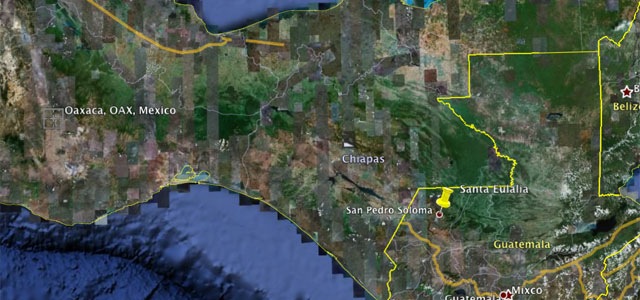Well, we finally got the story on Marci’s ailment. As we’d guessed/feared, her appendix was swollen and about to rupture. Untenable pain in the lower right abdomen can be other things, but this is the worst possibility here in the remote villages, because people are hesitant to go to the hospital. There’s not enough money, the bus trip is too long, their entire 50 person extended family can’t be with them in the waiting room, things like that. So, they suffer through it, then suddenly the pain goes away (because it burst) and they think everything’s OK. By morning, they’re dead.
In this case, Marci was in so much abdominal pain that she was vomiting uncontrollably. Her uncle (who we like and is normally really with it) was boneheaded and said, “She complains all the time; you shouldn’t take her to the hospital just for that. It will pass.” Then the family did what any good Guatemalan would: they broke out the candles, and started an all-night prayer vigil. Unfortunately for Marci, she was obliged to participate. A few hours into it, her mother looked up, figuring Marci must be healed since the complaining had stopped. Nope, Marci had just passed out.
“She’s going to die!” her aunt said. Her niece heard, “She’s dead!” and ran screaming to the health center to proclaim the news, that the fourth villager this month had passed away. The nurse Lucia and our buddy Manuel (president of the health committee) were there at the time, along with a heap of drop-in patients, and everyone poured out of the center to see what was going on. When they arrived at Marci’s house, the nurse saw that she was indeed still alive but in a terrible way, and they got someone in the village with a pickup to take her into town to see the closest doctor. He, in turn, sent her straight away to the public hospital in Huehuetenango, 4 hours away. We STILL don’t even have an ambulance in the main town, so they talked one of our three Policia National Civil officers (sortof like our FBI) into taking her. Surgeons operated that evening.
So, she lives, mostly by luck. Life is hard in Guatemala.

Switching topics slightly… by now, most of you have heard of influenza H1N1, or the “Swine Flu”. It’s already killed a few hundred people in several different countries, and there is a lot of hype about how it may become a serious pandemic. Even though the whole thing started next door in Oaxaca Mexico, I personally am not really worried about it. People don’t travel a lot here, and we don’t get many visitors.
Guatemalans DO watch the news, though, and they are somewhat concerned, even though there is only one confirmed case so far in the whole country. And there is a lot of misinformation here, just like in the US: the first day the news broke out, not a pound of pork was sold in the entire Huehuetenango market, even though the disease cannot be passed by eating pork. Since we’re the local health workers and pseudo-celebrities, we were asked to do a presentation on how to avoid influenza H1N1.
The venue was the regional council’s finance meeting, a good choice because over 100 people show up, with at least one represenetative from each community in the region. We were the “opening act”. Since we hate to put people to sleep, we usually throw in some pretty silly stuff. During Emily’s opening comments, I start sneezing, and then sneeze right on her… with a handful of flour over my mouth, so it sprays all over her. Hilarious. We also coat our hands with red glitter before the lecture, and shake hands with as many people as we can before we start. About halfway through the lecture, we explain what germs are, and ask the audience to look at their hands. Most can find glitter in the cracks of their hands, and by halfway through the lacture, many even have it on their faces. It illustrates how germs can pass so easily from one person to the next, getting into your mouth and eyes, making you sick.
Everyone likes to laugh at the gringoes, but these things get them to relax a little and listen. Thing is, the lecture contains nothing new; you prevent Swine Flu the same way you prevent most transmittable diseases: wash your hands. Sure, not sharing lollipops or sodas and covering your mouth when you sneeze, they help too, and we discuss them. But the handwashing is the big one, and they always need to hear the message again.